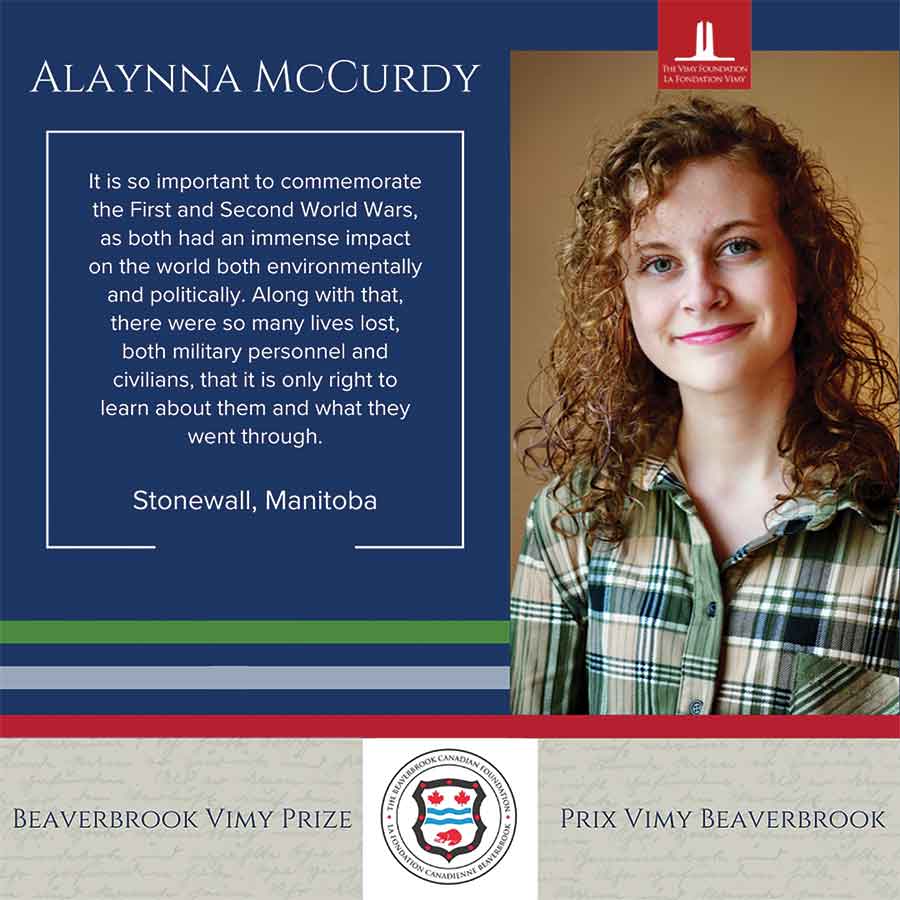A Stonewall high school student will be joining an elite international group travelling to Europe this summer as part of the 2025 Beaverbrook Vimy Prize program.
Alaynna McCurdy is one of just 16 students from Canada, the United Kingdom and France selected to take part in the prestigious experiential learning program hosted by the Vimy Foundation.
From Aug. 1 to 11, participants will visit historic battlefields, cemeteries and museums across France and Belgium, exploring the legacy of the First and Second World Wars through an immersive, theme-based approach.
“I’m incredibly honoured and excited to represent my community and country through this opportunity,” said McCurdy, who attends Stonewall Collegiate.
She first learned about the program from her Cinema as a Witness to History teacher, Mrs. Voth.
“She got an email from the Interlake School Division about the opportunity, and since she knew I was passionate about history, she told me right away,” McCurdy said. “I’ve always been interested in the world wars, so I figured it wouldn’t hurt to apply — at the very least, I’d have a new reason to talk about history with my friends.”
Participants were selected through a highly competitive process that included an environmental essay, a personal video, resume, reference letter, and an art analysis of a war-themed painting.
When McCurdy found out she had been chosen, she said the news didn’t feel real at first.
“I saw the email and just thought, ‘they must have sent this to the wrong person.’ But as I read through it, I realized I had actually been chosen, and I was ecstatic,” she said. “I ran up to Mrs. Voth, to Mr. Leschyson who wrote me a reference letter, and to all my friends to tell them I got in. I messaged my family, and everyone responded with so much joy. I even called my Uncle Shayne, who gave me the courage to apply.”
McCurdy said she’s most looking forward to seeing the places she’s spent years researching.
“Arras and Dieppe especially — those are places I’ve read so much about. Getting to experience them in person is going to be incredible.”
The program is designed to give students aged 15 to 17 a deeper understanding of how the wars shaped not just Europe, but global history. Through on-site learning, students will examine both well-known and lesser-told stories of the wars, challenge traditional narratives, and reflect on their lasting environmental and social impacts.
“I’ve found that you learn more through experience than you ever could from just reading a book or article,” said McCurdy. “Being there — seeing what the soldiers saw, being where they lived and fought — gives you a whole new level of understanding.”
Of all the application components, McCurdy said the most difficult part was filming the personal video.
“I’m not a fan of watching myself talk on camera, and I was so worried I’d mess it up,” she said. “With a video, they see your face, your thinking process — it felt much more vulnerable than the essays.”
For her environmental essay, McCurdy focused on the dual issues of urban sprawl and habitat destruction in Manitoba.
“I wrote about the loss of prime agricultural land and the destruction of the Tall Grass Prairie, and how both problems are interconnected,” she said. “It’s important to find a middle ground to minimize the risk of losing either resource completely.”
Her chosen artwork analysis focused on The Stretcher-Bearer Party by Cyril Barraud.
“I was drawn to that image because I had recently read Lifesavers and Body Snatchers by Tim Cook, which focuses on WWI medicine and the lives of stretcher-bearers,” said McCurdy. “I wanted to explore how war affects not just people, but the land itself — both in the short and long term.”
She said the application process and research have already influenced how she thinks about history.
“I used to focus mostly on the human cost, but now I also think about how the land was damaged, how ecosystems were destroyed. War doesn’t just leave scars on people — it leaves scars on the environment too.”
As she prepares to travel, McCurdy said she’s thinking about what she’ll bring back with her.
“It’s such an important part of our history, and I think it’s immensely important to share the stories we learn so that they’re never forgotten,” she said.
Being selected for the program has also sparked ideas about her future.
“I think this experience will definitely influence my educational goals. It’s helped me think more seriously about history as a career path — or at least something I want to keep exploring.”
And perhaps most of all, McCurdy said she’s looking forward to learning alongside fellow students from across the globe.
“Being part of an international group like this is such a rare opportunity. We’re all coming with different backgrounds, and I think we’ll learn a lot from each other.”
The Beaverbrook Vimy Prize is supported by the Beaverbrook Canadian Foundation and organized by the Vimy Foundation, a charity committed to promoting awareness of Canada’s role in the First World War. For more information about the program, visit vimyfoundation.ca.
What is the Beaverbrook Vimy Prize?
The Beaverbrook Vimy Prize is an annual scholarship program that brings together 16 youth aged 15 to 17 from Canada, the UK, and France for a two-week educational tour of First and Second World War sites in France and Belgium. The program is run by the Vimy Foundation and supported by the Beaverbrook Canadian Foundation. It promotes international understanding, historical awareness, and youth leadership through immersive, site-based learning.
